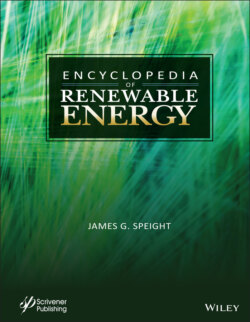Читать книгу Encyclopedia of Renewable Energy - James Speight G., James G. Speight - Страница 167
Bioethanol
ОглавлениеBioethanol is ethanol produced from biomass feedstocks, which includes ethanol produced from the fermentation of crops, such as corn, as well as cellulosic ethanol produced from woody plants or grasses. The resource base is gradually widening to cellulosic crops, and even wood. Such low-cost feedstock would result in a global increased production potential for low-cost ethanol.
Unlike crude oil, bioethanol is a form of renewable energy that can be produced from agricultural feedstocks. It can be made from various crops such as sugar cane, potato, and maize.
The long-term prospects of bioethanol, or any other biofuels such as methanol and biodiesel, depend on biomass availability. Concerns related to its production and use relate to the large amount of arable land required for crops, as well as the energy and pollution balance of the whole cycle of ethanol production. The availability of bioethanol depends on future food demand and food patterns, other types of land use, and agricultural productivity.
See also: Alcohols, Bioethanol Production, Ethanol.
